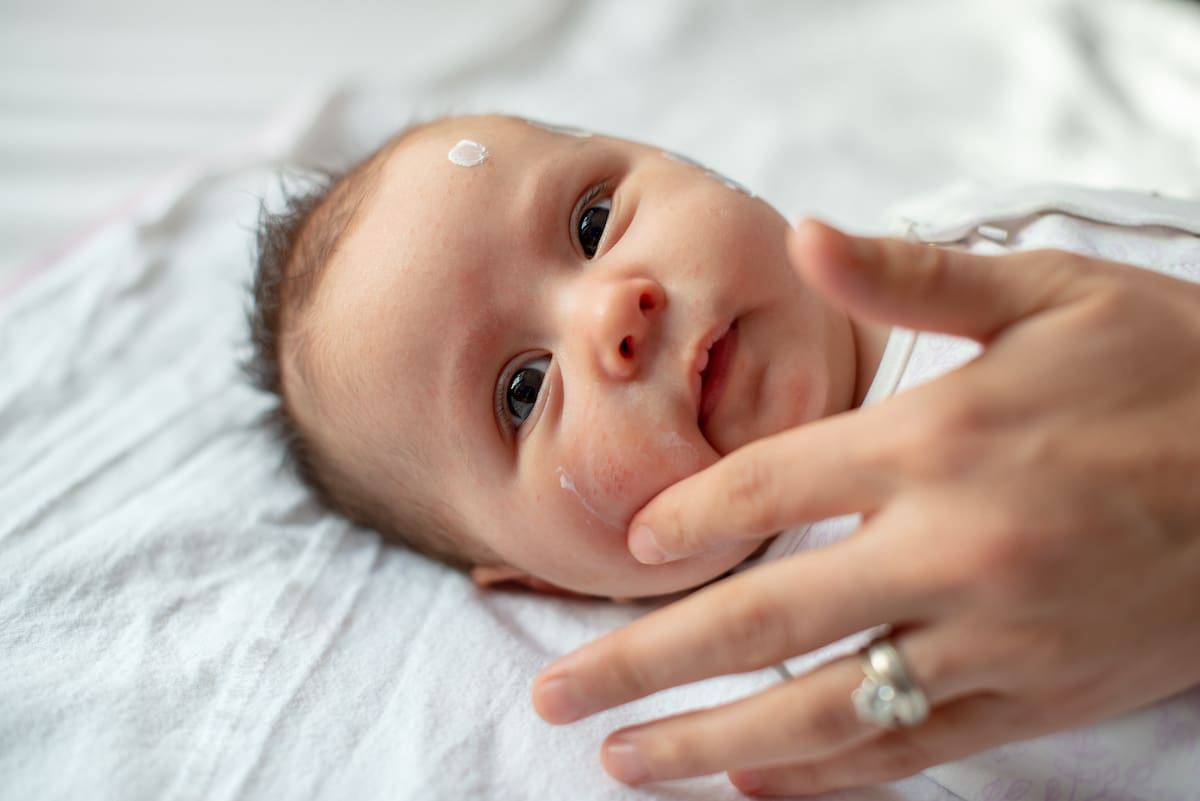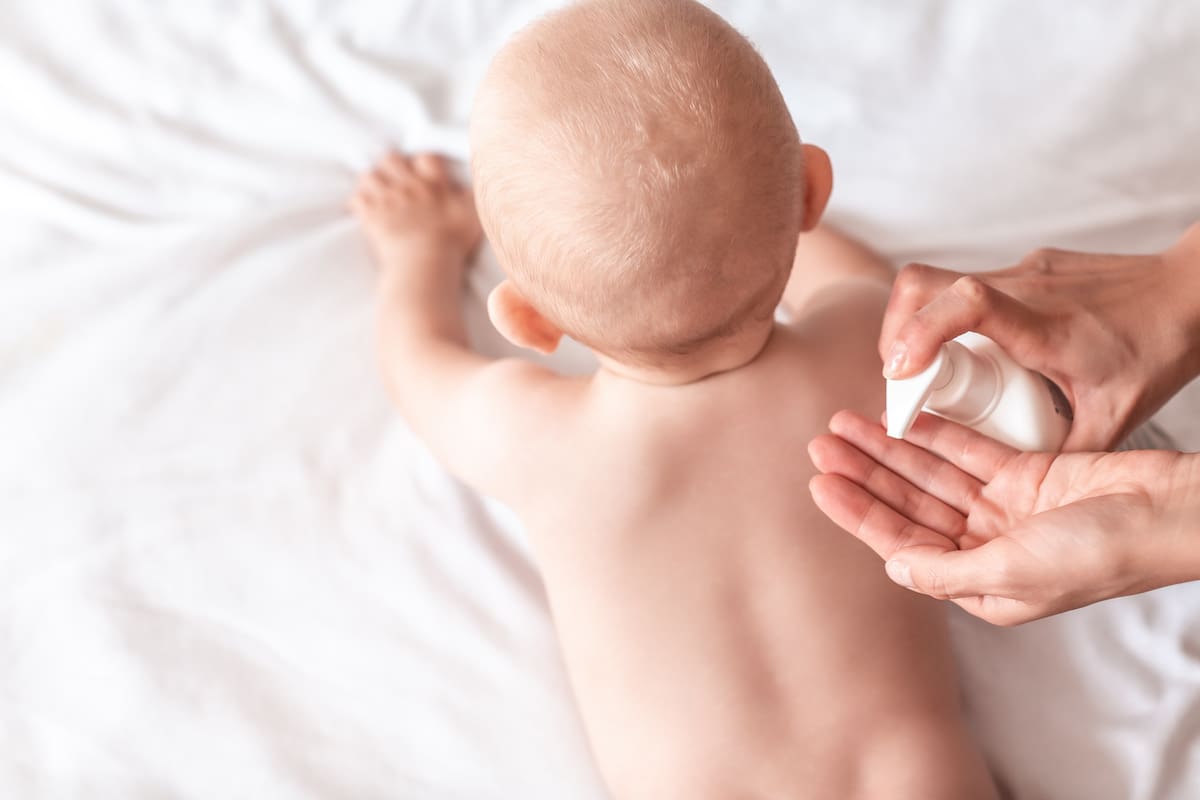Australian children have one of the highest incidences of eczema in the world with one in three infants affected1. With 95% of cases occurring before the age of five2, childhood eczema (which requires a diagnosis by a medical practitioner) can be a debilitating and chronic condition causing discomfort and irritation if not managed properly.
The good news is that there are several ways to reduce the symptoms in your child, however with long waiting periods for some dermatologists and around 225,000,000 results on Google for childhood eczema, finding the correct advice can be challenging.
To help clarify frequently asked questions, we’ve investigated seven myths about childhood eczema using scientifically backed evidence.
Myth #1: Eczema is contagious
Fact: Childhood eczema is not contagious3 and children with the condition do not need to be isolated during a flare-up. However, dry and cracked eczema-affected skin can be more prone to secondary bacterial or viral skin infections, so keep affected children away from anyone with cold sores3 or infected wounds4.
Myth #2: Eczema will go away on its own
Fact: While it’s true that some children can and will grow out of it when their skin matures, around 10% will continue to suffer from eczema into adulthood5. Research is yet to discover why this occurs with some children and not with others. However, for most children affected by some form of eczema, the use of topical corticosteroids to control flares, combined with daily emollient products is effective for long-term management. At present, there is no cure for eczema.

Myth #3: Eczema is not hereditary
Fact: Research shows that there is strong evidence that eczema is hereditary6,7. In fact, there is belief that mutated genes passed on from a parent may be responsible and increase the likelihood for eczema7. However, the gene may only be identified when the child is exposed to an environmental trigger and a flare-up occurs7.
Myth #4: Babies can’t develop eczema
Fact: While it’s common for babies to suffer from cradle cap and seborrheic eczema, the good news is that these conditions aren’t chronic and tend to improve at the same pace as it spreads8. In even better news, having cradle cap or seborrheic eczema does not mean that your baby will go on to have atopic eczema. If the baby goes on to have eczema, it’s important to understand that the conditions are unrelated8. Researchers don’t exactly know why babies get eczema, but they believe it may be due to genetic and environmental factors, such as a family history of eczema or asthma. Babies with eczema are nine times more likely to develop asthma later in life8.
Myth #5: You can only develop eczema on the face and hands
Fact: Childhood eczema can affect any part of the body. Babies with eczema usually have red rashes on their faces, but they can also get it on their scalp, behind the ears and on their bodies. Toddlers and pre-schoolers tend to be affected in the skin creases around the knees, wrists, elbows and ankles.4,9
Myth #6: Moisturisers cause eczema flare-ups
Fact: Daily emollient use is recommended by dermatologists to protect the skin10 barrier, manage eczema and reduce flare-ups. However, most moisturisers aren’t created with eczema patients in mind, and few are supported by clinical testing. In fact, heavily perfumed moisturisers and cosmetics can make eczema symptoms worse.
Try: QV Dermcare Eczema Daily, is clinically designed and tested for mild to moderate eczema skin on 18 years and above. Featuring ingredients such as glycerine, ceramides, lactic acid and niacinamide in combination to repair the skin barrier, improve skin hydration and reduce associated itchiness and dryness11. Research shows that 85% of eczema users experience less flares, irritation, and itch after using the QV Dermcare Eczema Daily range regularly12. Always read the label and follow the directions for use.
Myth #7: Eczema is more common in adults than children
Fact: Current research suggests that eczema affects around 30% of infants, with 95% most commonly diagnosed before the age of five years2. In Australia, 1.6 million adults are estimated to suffer from eczema. Of those adults, some would be experiencing lingered symptoms from childhood, others will have eczema for the very first time13. In reverse, some babies and children who had eczema in their early years find they outgrow it or have managed to keep it at bay by recognising and avoiding triggers.
REFERENCES
1. Murdoch Children’s Research Institute. Eczema [Internet]. 2023 [cited 2023 Apr 17]. Available from https://www.mcri.edu.au/impact/a-z-child-adolescent-health/d-f/eczema.
2. Thomsen SF. Atopic dermatitis: natural history, diagnosis, and treatment. ISRN Allergy. 2014;2014:354250
3. The Royal Children’s Hospital. Eczema [Internet]. 2018 [last updated 2018 Mar; cited 2023 Apr 17]. Available from https://www.rch.org.au/kidsinfo/fact_sheets/Eczema/
4. Cherney K. Is Eczema Contagious [Internet]. 2019 [last updated 2019 Mar 8; cited Apr 17]. Available fromhttps://www.healthline.com/health/is-eczema-contagious#infected-eczema
5. Nguyen L. How common is eczema in Australia? [Internet]. 2015 [last updated 2015 Dec 31; cited 2023 Apr 20]. Available from https://bhcmedicalcentre.com.au/uncategorized/how-common-are-eczema-and-psoriasis-in-australia/.
6. Barnetson RS, Rogers M. Childhood atopic eczema. [Internet] BMJ. 2002 [last updated Jun 8; cited 2023 Apr 24]. Available from https://www.ncbi.nlm.nih.gov/pmc/articles/PMC1123328/.
7. Santhakumar S. What to know about eczema and genetics. [Internet] Medical News Today. 2021 [last updated 2021 Sep 3; cited 2023 Apr 24]. Available from https://www.medicalnewstoday.com/articles/is-eczema-hereditary#is-it-hereditary.
8. Babies who have Eczema [Internet]. Eczema Association Australasia. [cited 2023 Apr 24]. Available from https://www.eczema.org.au/babies-who-have-eczema/.
9. Eczema. [Internet] Healthdirect. 2022 [last updated 2022 June; cited 202 Apr 17]. Available from https://www.healthdirect.gov.au/eczema.
10. Cork, Dr M [Internet] Moisturizers (Emollients) and Eczema. [cited 2023 Apr 28]. Available from https://www.eczema.org.au/moisturisers-emollients-and-eczema/.
11. Spada F et al. Dermatol Ther 2021;34(4):e14970. (n=100) Study sponsored by Ego Pharmaceuticals Pty Ltd.
12. Consumer satisfaction survey on people with mild or moderate eczema. n=48. Participants confirmed condition status through a declaration. Survey conducted by Beauty Heaven on behalf of Ego Pharmaceuticals Pty Ltd. 2021.
13. Adults who have Eczema. [Internet] Eczema Association Australasia. [cited; 2023 Apr 24]. Available from https://www.eczema.org.au/adults-who-have-eczema/

